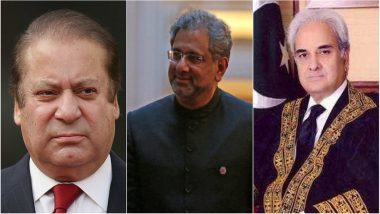Islamabad, July 24: In the 2013 general elections, the Pakistan Muslim League-Nawaz (PML-N) wons the polls with a decisive mandate. This marked the first occasion in the Islamic republic when the incumbent government completed its full tenure and smoothly handed over the reins to a rival party. Mian Muhammad Nawaz Sharif was thereby appointed as the Prime Minister of Pakistan on a third occasion.
Similar to all his predecessors, Sharif was also unable to complete a full-term in power despite winning the polls with a two-third majority. Convicted for not disclosing the income he received through his son's offshore, Sharif was forced to demit Office on July 28, 2017.
PML-N veteran and Sharif loyalist Shahid Khaqan Abbasi took over as the next Prime Minister and completed the remainder of the party's term in power till May 31, 2018. Subsequently, former Chief Justice Nasir-ul-Mulk was appointed as the caretaker PM for the smooth conduct of elections.
Brief Profiles of the Three Prime Ministers of Pakistan Since 2013:
- Nawaz Sharif: The 68-year-old has presided over the PM of Pakistan on three occasions - 1990-93, 1997-99 and 2013-17.
Earlier, he served as Chief Minister of Punjab, the largest province of the nation, between 1985-1990.
A businessman by background, Sharif entered into politics in early 70s' after his family's steel business was devastated due to then PM's Zulfikar Ali Bhutto's nationalisation policy.
In 1976, he joined the Pakistan Muslim League Nawaz. In 1993, after being ousted from power by the Benazir Bhutto-led PPP, the party was sharply divided which led to his ouster and formation of a new party, the Pakistan Muslim League-Nawaz.
- Shahid Khaqan Abbasi: The 59-year-old Sharif loyalist made his entry into politics back in 1988, when he was elected to national assembly from Rawalpindi. During the second tenure of Sharif as the PM of Pakistan, he served as the chairman of the state-owned Pakistan International Airlines.
In 2008, when the coalition government was formed by the PML-N with the PPP, Abbasi served as the Commerce Minister in the prime ministership of Yousuf Raza Gilani.
After the PML-N was elected with full majority in 2013, Abbasi was assigned the independent charge of Ministry of Petroleum and Natural Resources. After Sharif's disqualification, he was appointed by the PML-N as the 18th Prime Minister of Pakistan.
- Nasir-ul-Mulk: The former Chief Justice of Pakistan has been appointed as the interim PM since May 31, 2018. His tenure would conclude following the smooth conduct of elections and appointment of a new government to power.
The 68-year-old retired judge was first elevated as the Chief Justice of Peshawar High Court in 2004. In 2006, Mulk was part of the judges' panel which overruled President Pervez Musharraf's decision to impose martial law in the nation.
In 2013, Mulk served as the Chief Election Commissioner of Pakistan. Under his watch, the polls for the national assembly, along with the provincial assemblies of Sindh, Balochistan, Khyber-Pakhtunkhwa and Punjab.
Shortly after the elections, Mulk was appointed by PM Sharif as the Chief Justice of Pakistan Supreme Court on July 6, 2014. His tenure concluded on July 16, 2015, when he retired.
(The above story first appeared on LatestLY on Jul 24, 2018 04:49 PM IST. For more news and updates on politics, world, sports, entertainment and lifestyle, log on to our website latestly.com).













 Quickly
Quickly


